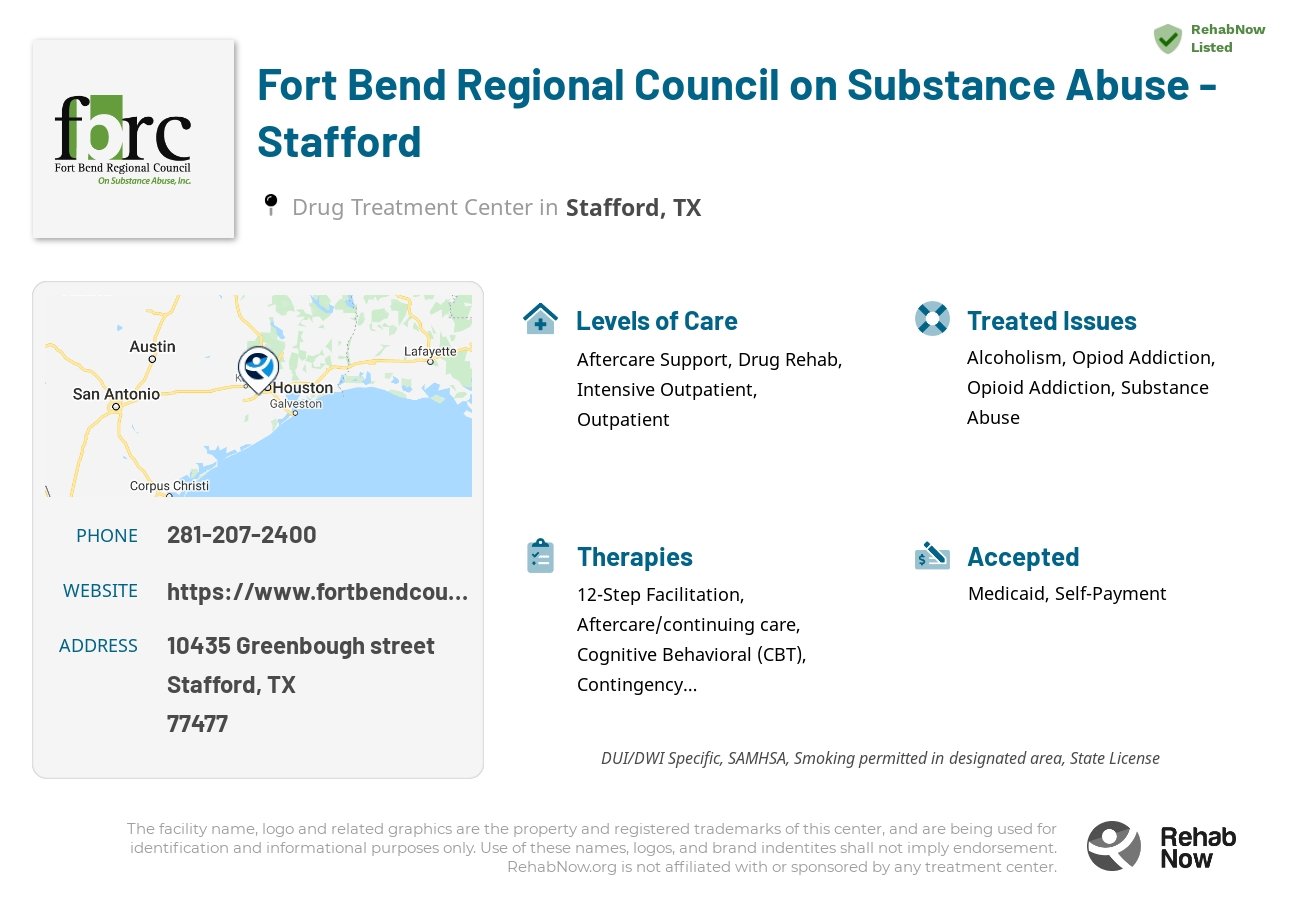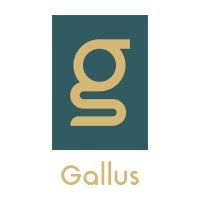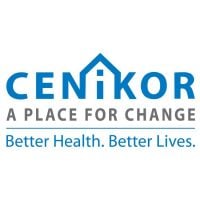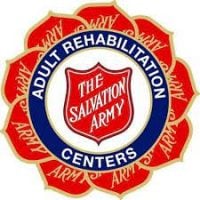Fort Bend Regional Council on Substance Abuse
Drug Rehab Center in Stafford, Texas
The Fort Bend Regional Council on Substance Abuse offers a SAMHSA accredited and State licensed treatment facility with individualized treatments and a comprehensive approach to help individuals suffering from addiction and mental health issues.
About This Texas Facility
Fort Bend Regional Council on Substance Abuse, located in Stafford, Texas, has been serving the community since 1976. This private rehab specializes in the treatment of alcoholism, drug addiction, opioid addiction, and substance abuse, providing much-needed support to individuals and families in the area.
- Comprehensive care for a wide range of addictions, including alcoholism, opioid addiction, and substance abuse
- Accredited by SAMHSA and holds a State License, ensuring the highest standards of quality and safety
- Offers aftercare support, drug rehab, intensive outpatient programs, and outpatient levels of care
With accreditations from SAMHSA and a State License, Fort Bend Regional Council on Substance Abuse is committed to providing the highest quality of care to those seeking help with addiction.
The facility treats a variety of addictions, including alcoholism, drug addiction, opioid addiction, and substance abuse. They offer a range of treatment options, such as aftercare support, drug rehab, intensive outpatient programs, and outpatient levels of care.
Genders
Ages
Modality
Additional
Accreditations
State License
SAMHSA
Conditions and Issues Treated
Substance Abuse Treatment is important when getting sober, as it helps addicts learn the skills they need to live a clean life. There are many different kinds of recovery treatment, including medication-assisted therapy, behavioral therapeutic approaches and self-help groups, as well as counseling.
Opioid abuse has become a national epidemic in the last decade. The US has one of the world’s highest rates of opioid use and abuse, as well as opioid-related deaths. Opioids are classified as Schedule II-IV controlled substances in the US due to their high potential for abuse.
Oxycodone, hydrocodone, methadone, and fentanyl are the most common Opioids and are commonly prescribed to treat pain. Tolerance to opioids develops over time, making life difficult, if not impossible, without them. Opioid users often obtain the drugs illegally. They can be drug dealers, friends, or family members who do not have valid prescriptions.
The desire for a more intense high than prescription opioids can quickly lead to heroin use. Heroin users are more prone to illness and death due to the high risk of overdose.
Many opioid addicts who seek treatment believe that the only way to overcome their addiction is through medical detox and long-term drug addiction rehab. To help patients wean off their addiction and reduce the risk of overdose, medication-assisted therapy (MAT) involves prescribing a replacement opioid. Doctors use MAT in conjunction with other anti-craving medications to help patients maintain recovery. Due to the high risk of relapse, MAT is often combined with individual and group counseling and social support programs.
Levels of Care Offered at Fort Bend Regional Council on Substance Abuse
This center offers a variety of custom treatment tailored to individual recovery. Currently available are Aftercare Support, Drug Rehab, Intensive Outpatient, Outpatient, with additional therapies available as listed below.
Intensive outpatient treatment is a form of addiction care that allows patients to continue living at home while undergoing treatment. This type of care is appropriate for patients who have been treated in residential treatment programs. Intensive outpatient programs include regular visits to the facility providing therapy, and patients gradually return to their routine life. IOP benefits most when patients have a supportive family member or friend to help them recover.
The first step to getting into an intensive outpatient program is to attend a detoxification facility. Detoxification facilities are designed to remove substances from the body safely. The patient will attend sessions designed to help them understand their addiction and its impact on their lives. While in an intensive outpatient program, therapy sessions are scheduled three to five times per week, with the patient attending no more than two sessions in one day.
An outpatient treatment program is set up to help with alcohol or drug addiction or a co-occurring disorder. The patient must attend the facility for their therapy and other programs but can return home each night.
The frequency of mandatory attendance decreases after much of Fort Bend Regional Council on Substance Abuse‘s program is complete.
Outpatient treatment is a recovery approach that allows recovering addicts to live at home while getting rehab for addiction
An outpatient can include day treatments which include attending group sessions one hour per week. A person living in an outpatient environment may be allowed the opportunity to work full time if they choose to and continue studies without interruption from drugs/alcohol.
Outpatient treatment is an option for people who want to maintain their careers and families. Outpatients live at home but attend treatment such as individual counseling, group counseling, or twelve-step meetings during the day.
Aftercare support is vital to the success of someone in drug or alcohol treatment. It involves assisting with entering a sober living home, getting career counseling or educational assistance and even getting the individual lined up with programs like AA and NA. This support helps recovering addicts readjust to normal day-to-day activities and maintain sobriety.
When a person is in drug or alcohol treatment, they have to increase their focus on themselves. They need to learn how to recognize the triggers that cause them to relapse and learn the habits that would benefit them if they were to be sober. This is all part of the growth in recovery, and aftercare is essential to that process.
Therapies & Programs
At Fort Bend Regional Council on Substance Abuse , to learn from past mistakes and improve one’s situation, the recovering person meets individually with a therapist. The counselor or therapist will address addiction causes, triggers, mental issues, dual diagnosis, and aftercare plans during this time. This is a very intense and challenging process. Some clients find it easier to open up to someone other than family or friends who understand their struggles with addiction.
Couples therapy sessions are typically used to help couples in recovery from drug addiction work through their issues. These types of sessions can be beneficial for many reasons, including the fact that they add a layer of accountability when both partners in a couple are recovering from addiction.
Therapy can also provide addicts with another effective way to cope with stress and avoid relapse during difficult situations. This type of therapy can help improve communication with their partners, which can strengthen the relationship and prevent future problems that might lead to relapse.
Family therapy is a crucial part of drug treatment and getting sober. It is one of the most effective ways to help addicts stay on the path to long-term sobriety. An addict’s family can play a vital part in helping them to avoid relapse. They can spot the warning signs and help them get back on track.
In group therapy, recovering addicts meet with a therapist and other people in recovery. Some groups are closed, meaning only people who share the same addiction or problem can attend. Others are open to anyone who wants to stop using drugs or drinking alcohol. Group therapy sessions typically focus on one topic each week or month so that recovering addicts can discuss issues they face daily.
Cognitive Behavioral Therapy (CBT) is based on the idea that how we feel, think and act all interact together. It helps people explore their thoughts for problems (or false beliefs) that influence their mood and actions. CBT is very goal-oriented, which means that the therapist and patient work together on a specific problem. In addition to helping a client focus on thoughts that can be changed, CBT also allows them to take an active role in their treatment. Our thoughts determine our feelings and behaviors; our feelings affect our thoughts, and our behaviors change our thoughts and feelings.
Rational Emotional Behavior Therapy (REBT) offers benefits to addicts in a wide range of situations. This type of therapy helps individuals better understand their emotions and how to manage them in a healthy way.
Individuals who have used addiction treatment services have found this type of therapy beneficial in the following ways:
- Helps individuals identify, understand and manage their emotions in a healthier way
- Assists addicts in developing coping skills to help avoid relapse
- Encourages increased tolerance and less judgmental thinking
- REBT combines cognitive and emotive techniques to help individuals overcome harmful, self-defeating behaviors.
Drug and alcohol addiction can lead to a breakdown in life skills. Learning certain life skills can help those who are struggling with addiction. Life skills training at Fort Bend Regional Council on Substance Abuse in Stafford, TX teaches patients skills such as time management, budgeting, and social abilities to improve their quality of life and prevent relapse.
An addict’s life skills are maladaptive, meaning they are counterproductive. An addict may have learned poor time management skills growing up, have a hard time budgeting money, or be socially awkward. An addict’s poor life skills can lead to relapse and the inability to achieve long-term sobriety. Life skills training teaches patients effective coping mechanisms, which can help them live a clean and sober life.
Payment Options Accepted
For specific insurance or payment methods please contact us.
Fort Bend Regional Council on Substance Abuse Associated Centers
Discover treatment facilities under the same provider.
- Fort Bend Regional Council on Substance Abuse in Rosenberg, TX
- Fort Bend Regional Council on Substance Abuse - Stafford in Stafford, TX
- Fort Bend Regional Council on Substance Abuse - Rosenberg in Rosenberg, TX
Learn More About Fort Bend Regional Council on Substance Abuse Centers
Additional Details
Specifics, location, and helpful extra information.
Stafford, Texas 77477 Phone Number(281) 207-2400 Meta DetailsUpdated April 15, 2024
Staff Verified
What else do people call Fort Bend Regional Council on Substance Abuse?
People have occasionally also searched for “Fort Bend Regional Council on Substance Abuse in Texas”
Patient Reviews
There are no reviews yet. Be the first one to write one.
Stafford, Texas Addiction Information
Texas is one of the primary hubs for drug smuggling into the country. The border between Texas and Mexico is more than 1,000 miles long. More than 10 million residents use alcohol every year and more than 25% of those are minors. Alcohol and drug use has become so common in Texas that almost 15% of all deaths can be attributed to these substances.
Binge drinking is a major problem in Stafford, Texas. Prescription drugs are also being abused at an alarming rate. This has led to an increase in drug-related crimes, overdoses, and deaths. The most commonly abused drugs in Stafford are alcohol, methamphetamine, cocaine, and heroin. If you're struggling with addiction, please reach out for help. There are a variety of treatment options available in Stafford. You don't have to go through this alone.
Treatment in Nearby Cities
- Stephenville, TX (238.5 mi.)
- Wimberley, TX (154.4 mi.)
- Coleman, TX (275.8 mi.)
- Clarksville, TX (277.6 mi.)
- Scurry, TX (206.2 mi.)
Centers near Fort Bend Regional Council on Substance Abuse
The facility name, logo and brand are the property and registered trademarks of Fort Bend Regional Council on Substance Abuse, and are being used for identification and informational purposes only. Use of these names, logos and brands shall not imply endorsement. RehabNow.org is not affiliated with or sponsored by Fort Bend Regional Council on Substance Abuse.












